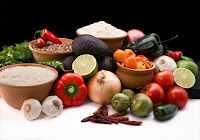We all want the best food for our pets, and there are so many companies telling us what we should feed. Many companies boast having natural, organic, holistic or even human grade products. Well, what are the qualities of those products and are they really what the companies claim? What is the difference in those products? Let's look at the regulatory definitions of these four terms:
Natural - A feed or ingredient derived solely from plant, animal or mined sources, either in its unprocessed state or having been subject to physical processing, heat processing, rendering, purification, extraction, hydrolysis, enzymolysis or fermentation, but not having been produced by or subject to a chemically synthetic process and not containing any additives or processing aids that are chemically synthetic except in amounts as might occur unavoidably in good manufacturing practices.
Organic - organic meat, poultry, eggs, and dairy products come from animals that are given no antibiotics or growth hormones. Organic food is produced without using most conventional pesticides; fertilizers made with synthetic ingredients or sewage sludge; bioengineering; or ionizing radiation. Before a product can be labeled "organic," a government-approved certifier inspects the farm where the food is grown to make sure the farmer is following all the rules necessary to met USDA organic standards.** (Quoted from USDA)
Holistic - no legal definition, therefore, no regulation for the use of the term.
Human Grade - The terms "human grade" or "human quality" have no legal definition. Claims on animal foods should not be false or misleading. A claim that something is "human-grade" or "human-quality" implies that the article being referred to is "edible" for people in legally defined terms. For a product to be human edible, all ingredients in the product must be human edible and the product must be manufactured, packed and held in accordance with federal regulations in 21 CFR 110, Current Good Manufacturing Practice in Manufacturing, Packing, or Holding Human Food. If these conditions exist, then human-grade claims may be made. If these conditions do not exist, then making an unqualified claim about ingredients being human grade misbrands the product.** (Quoted from AAFCO)
Given that there is no legal definition, and hence no legal regulation for the use of the terms, "holistic" or "human grade," I would use extreme caution when choosing a pet food product with those labels. Anyone can use those terms with no backing and assurance that the quality perceived is, in fact, the quality delivered.
The term "organic" is regulated by the USDA. However, companies can sometimes use this term in a misleading way. Pay close attention to whether the food is claiming to be "organic" or "made with organic" ingredients. The latter option can be claimed by a food that only has a few organic ingredients without the entire product being organic.
The more you know, the better prepared you can be in choosing a pet food. Take time to learn what ingredients mean, what labels mean and what is truth versus marketing strategy. Or, at least take the time to ask someone who knows what food is best for your pet.









